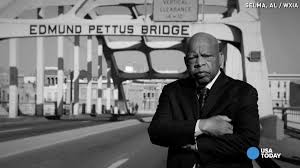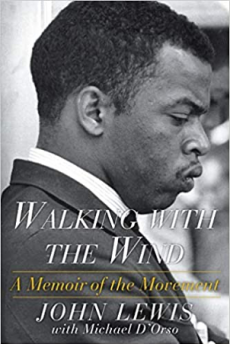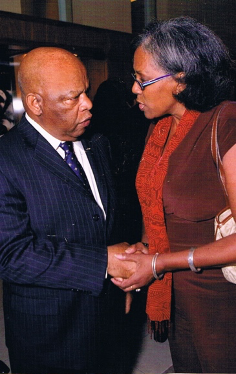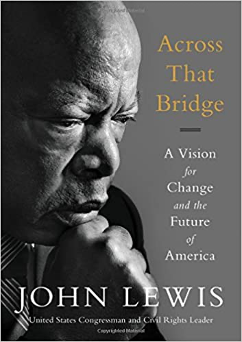This content is being reviewed in light of recent changes to federal guidance.
In Memoriam: John Lewis

“We want our freedom; we want it now”
March of Washington, 1963
John Lewis (1940-2020)
My autographed copy of John Lewis’s memoir, Walking with the Wind, belonged to my mother, who stood in line to get it, she said, “just in case I missed it.” “To Helen G. Moore, Keep the faith, John Lewis,” it read. Icon, a national treasure, idol, moral compass – none quite describe the man whose name is imprinted in every memory I have of growing up in Georgia. He knew his calling early. Intent on being a minister, a career on which he had already embarked, he left his hometown of Troy, Alabama headed for seminary in Nashville. But the ministry was not his destiny, at least in the traditional sense. His nation had called him into service, and once his family had given him their blessing, his people would give him their trust. That was all he ever needed. We know the popular outline of his story well. He met Martin Luther King, he was the youngest speaker at the March on Washington, and he became the Congressman from Georgia for life. The more he was brutalized during his early days as an activist, the more committed he became, a “ferocious fighter,” Cory Booker called him, for social justice. Lewis was willing to bear the weight of a movement on his shoulders, to become the conscience of our nation, and he refused to stop until the job was done.

What John Lewis stood for and his accomplishments will fill volumes, hardly touched upon in his 1998 memoir. The well-deserved eulogizing has already begun as we pause to give studied attention to his extraordinary life and legacy. We are grateful for Lewis’s omniscience, his willingness in his final days to allow others to focus more on him. John Lewis: Good Trouble,
the documentary by Dawn Lewis, is available now. Jon Meacham’s biography His Truth Is Marching On: John Lewis and the Power of Hope will hit stores in October. We can be assured that there is more to come.
Like many, I knew of but had never met John Lewis. As a native Georgian, however, I could not help but feel inspired by him. We Georgians live in the shadow of our leaders, fallen and living, and there is no dearth of them. Fortunately, I did meet John Lewis in 2007 at the University of Kansas, when he came to accept the Dole Institute Leadership Prize. While the usual superlatives accompanied the introduction to the award, John Lewis’s acceptance speech was more than modest. He settled into a conversation with the audience that felt like we were sitting around a table for Sunday dinner. With his generous anecdotes and cautious optimism, he was the most accessible person I had ever met. I brought my autographed copy of his memoir to share when I greeted him afterward. His first question was, “When are you coming home? We need you.” “Soon, I said,” admittedly startled but appreciative of his gentle push.

A second opportunity came when I was passing through Hartsfield airport in 2016, on one of my regular visits to Mom in Augusta. I had learned that he was doing a book signing for March, the graphic novel trilogy, which would become an award-winning bestseller. This innovative way of sharing the story of the Civil Rights Movement with a new generation was brilliant, I thought, and I wanted to thank him. He autographed a full set of the books for the Project on the History of Black Writing, and, looking directly at me, added, “So you finally came home, right?” I nodded only, quickly descending into the lengthy crowd, happy not to have to say more.
These two brief encounters gave me all I needed to know about John Lewis. I’ve never met a man so genuine, so plain-spoken, whose every word had special meaning. I realized how easily one could feel his aura when you were in his presence. And yet, Lewis was not an orator: he did not stand on empty speeches; he simply made it clear that he meant business. He was a man who believed in what could and should be done to make a more equal and just America for all people. That was always his goal, and it was the fight of his life. Since I had waited so long to meet him, I had expected to see a traditional politician. Instead, I met an extraordinary man of faith, whose sense of calm was contagious. His patience seemed to have grown with age. No less fierce, he was simply more determined. He knew that he was a long-distance runner, and the battle was far from over. He also knew that he had bequeathed his legacy to others, like Stacey Abrams, who accomplished the remarkable feat of running and almost winning the governor’s seat in the 2018 Georgia election.
John Lewis fought, he endured, without bitterness or anger, no wounds that one could see. He imparted a vision of what America could become, and much of what we have achieved, we owe to him. I believe the truth of the words in his autograph to my mother: John Lewis did indeed keep the faith in that vision for change and the future of America.

More John Lewis:
His Truth Is Marching On: John Lewis and the Power of Hope, forthcoming October 2020
John Lewis: Good Trouble, a documentary, 2020
Across That Bridge: A Vision for Change and the Future of America, 2017
March, (a trilogy) 2016
Walking with the Wind: A Memoir of the Movement, 1998